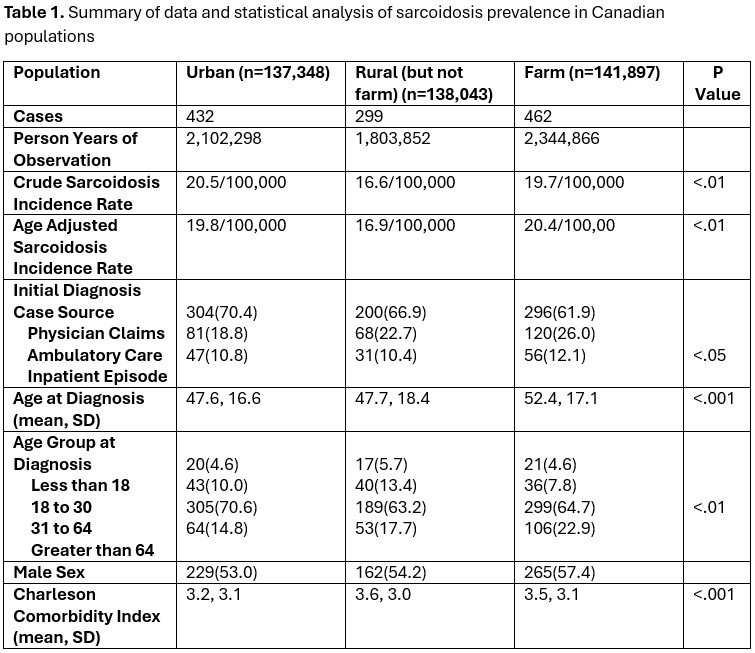Session Information
Session Type: Poster Session B
Session Time: 10:30AM-12:30PM
Background/Purpose: Sarcoidosis is a granulomatous inflammatory response thought to be due to a dysregulated immune response to environmental antigens.1 The prevalence of sarcoidosis varies geographically. There is evidence of increased prevalence among rural communities in the United States particularly in communities with prominent lumber industries.2,3 Use of wooden stoves and farm milk have been associated with rural communities and increased risk of sarcoidosis.3,4 Alberta is a Canadian province with the second-largest number of farmers in Canada. The main type of farming in Alberta includes oilseed and grain farming (34.3%), beef and feedlots (20.9%), dairy and milk (5%).5 The purpose of this study is to compare the prevalence of sarcoidosis among rural, urban and farm populations within Alberta, Canada.
Methods: This retrospective epidemiological study used a database from Alberta Health Services containing anonymous data from patients in Alberta, Canada. Alberta Health created a farm cohort through probabilistic matching with Alberta Agriculture, and Rural Development and the Farm Fuel Tax subsidy. Our population included all adults over the age of 18 years. Sarcoidosis was identified by ICD-10-CA based diagnosis. We also used the Alberta Health Care Insurance Plan (AHCIP), Discharge Abstract Database, Physician Claims and Alberta Vital Statistics to determine the patient’s sex, age, date of birth, geographical residence (rural or urban or farm), initial sarcoidosis diagnosis source, age of diagnosis, hospitalizations, Emergency Department visits, Coronary Care Unit visits, Intensive Care Unit visits and mortality. Descriptive statistics was used for data analysis of the matched population groups (rural, urban, and farm).
Results: Of the 417,288 patients identified, the urban population (137,348) had 432 cases of sarcoidosis identified (19.8 per 100,000) with an average age of diagnosis of 47.6 (SD 16.6) years. Of the rural population (138,043), 229 cases of sarcoidosis were identified (16.9 per 100,000) with an average age at time of diagnosis of 47.7 (SD 18.4). Of the farm population (141,897), 462 cases of sarcoidosis (20.4 per 100,000) were identified with an average age of diagnosis of 52.4 (SD 17.1) years of age. No statistically significant differences were seen between these populations. In patients with sarcoidosis, the most common cause of death was cancer (35%), followed by respiratory diseases (19%) and diseases of the circulatory system (16%). There was no significant risk for lung cancer mortality in patients with sarcoid lung disease.
Conclusion: Sarcoidosis is an inflammatory disease that we still have much to learn about. Comparing the prevalence of disease among different populations can be useful in identifying potential risk factors of disease for further investigation. Previous studies have identified increased prevalence of sarcoidosis among rural populations. In contrast, this study demonstrates no significant difference in the prevalence of sarcoidosis among the rural, urban and farm populations within Alberta, Canada.
To cite this abstract in AMA style:
Hans V, Voaklander D, Jones C, Yacyshyn E. Comparing the Prevalence of Sarcoidosis in Canadian Rural, Urban, and Farming Populations [abstract]. Arthritis Rheumatol. 2024; 76 (suppl 9). https://acrabstracts.org/abstract/comparing-the-prevalence-of-sarcoidosis-in-canadian-rural-urban-and-farming-populations/. Accessed .« Back to ACR Convergence 2024
ACR Meeting Abstracts - https://acrabstracts.org/abstract/comparing-the-prevalence-of-sarcoidosis-in-canadian-rural-urban-and-farming-populations/

